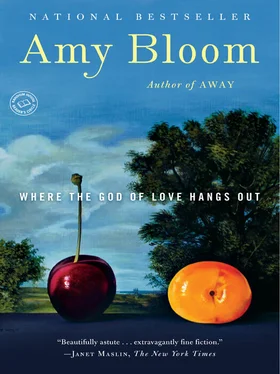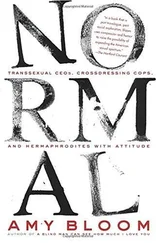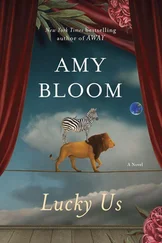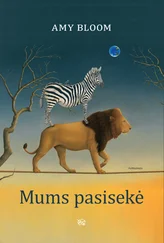“Come here, honey. Viens ici, chéri.” It is easier to be kind to him in French, somehow. Ari wears one of Buster’s old terry-cloth robes, the hem trailing a good foot behind him. He has folded the sleeves back so many times they form huge baroque cuffs around his wrists.
“I do not sleep.”
“That’s understandable. Je comprends .” Julia pats the empty side of the bed, and Ari sits down. His doleful, cross face is handsome in profile, the bedside light limning his Roman nose and straight black brows.
“Jordan hate me. You all hate me.”
“We don’t hate you, honey. Non, ce n’est pas vrai. Nous t’aimons .” Julia hopes that she is saying what she means. “It’s just hard. We all have to get used to each other. Il faut que nous … ” If she ever had the French vocabulary to discuss the vicissitudes of divorce and future happiness and loving new people, she doesn’t anymore. She puts her hand on Ari’s flat curls. “Il faut que nous fassions ta connaissance.”
She hears him laugh for the first time. “That is ‘how do you do.’ Not what we say en famille.”
Laughing is an improvement, and Julia keeps on with her French — perhaps feeling superior will do him more good than obvious kindness — and tries to tell Ari about the day she has planned for them tomorrow, with a trip to the playground and a trip to the hardware store so Lionel can fix the kitchen steps.
Ari laughs again and yawns. “I am tired,” he says, and lies down, putting his head on one of Julia’s lace pillows. “Dors bien,” the little boy says.
“All right. You, too. You dors bien.”
Julia pulls the blankets up over Ari.
“At night my mother sing,” he says.
The only French song Julia knows is “La Marseillaise.” She sings the folk songs and hymns she sang to the boys, and by the time she has failed to hit that impossible note in “Amazing Grace,” Ari’s breathing is already moist and deep. Julia gets under the covers as Ari rolls over, his damp forehead and elbows and knees pressing into her side. She counts the books on her shelves, then sheep, then turns out the bedside lamp and counts every lover she ever had and everything she can remember about them, from the raven-shaped birthmark on the Harvard boy’s shoulder to the unexpected dark brown of Peter’s eyes, leaving out Peaches and Lionel senior, who are on their own, quite different list. She remembers the birthday parties she gave for Lionel and Buster, including the famous Cookie Monster cake that turned her hands blue for three days, and the eighth-grade soccer party that ended with Lionel and another boy needing stitches. Already six feet tall, he sat in her lap, arms and legs flowing over her, while his father held his head for the doctor.
Ari sighs and shifts, holding tight to Julia’s pajama top, her lapel twisted in his hands like rope. She feels the wide shape of his five knuckles on her chest, bone pressing flesh against bone, and she is not sorry at all to be old and awake so late at night.
FORT USELESS AND FORT RIDICULOUS
Lionel Sampson reads to his brother from the flight magazine. “‘The Seeing Eye dog was invented by a blind American.’”
Buster laughs. “Really. Invented . Man must have gone through a hell of a lot of dogs.”
Julia’s sons, Buster and Lionel, are flying from Paris to Boston, to be picked up and driven to their mother’s house for Thanksgiving. Their driver will be an old Russian guy they’ve had before, big belly, a few missing teeth, with cold bottled water and The New York Times in the backseat. The two men are as happy as clams not to be driving in Buster’s wife’s minivan with all the kids and their laptops and iPods and duffel bags and Jewelle’s gallon containers of creamed spinach and mashed sweet potatoes, which Jewelle now brings rather than making them at her mother-in-law’s, because now that Julia’s getting on, although the house is clean and Jewelle is not saying it’s not clean, you do have to tidy up a little before you get to work in Julia’s kitchen, and Jewelle would just rather not.
Lionel closes the magazine and the homely flight attendant brings them water. (Remember when they were pretty? Lionel says. Remember when Pop took us to Denmark, Buster says, and they all wore white stockings and white miniskirts?) The flight attendant lays linen napkins in their laps. Lionel likes first class so much that even when a client doesn’t pay for it, he pays for the upgrade himself, and he’s paid for Buster’s upgrade, too. Lionel spends more on travel than he does on rent. His wife thinks he’s crazy. Patsine grew up riding the bumper of dusty Martinique buses and as far as she’s concerned, even now, your own seat and no chickens is all that anyone needs.
Buster opens another magazine. “Looky here, little girl in northern India is born with two faces. Only one set of ears, but two full faces. She’s worshipped in her village. Durga, goddess of valor.”
“Jesus,” Lionel says. “What’s wrong with people?” He looks at the picture of the little girl. “Patsine’s pregnant.”
“Oh, great. Good for you. Patsine’s great.” Buster has disliked all of Lionel’s other girlfriends and wives. The mean ones scared him and the nice, hopeful ones depressed him and Jewelle would say to him, after each meet-and-greet, “All I’m saying is, just once, let him bring someone who isn’t a psycho, a slut, or a Martian. Just once.” Buster pats his big brother on the knee and says, Well, aren’t you the proud papa, and the homely flight attendant smiles at them both. Mes félicitations, monsieur . She brings them pâté and crackers and two flutes of Champagne. Lionel gives his Champagne to Buster and asks for sparkling water.
Buster keeps reading. “It says the village chief wants the government to build a temple to the two-faced baby.”
“Who wouldn’t,” Lionel says.
They’re over the north Atlantic, only ten hours until home and eating a pretty good lunch, as Buster is not one to say no to a good meal. Buster sips his Champagne and Lionel drinks his Perrier and stifles his envy and longing by reviewing all the terrible things that happened to him when he was drinking. He nearly killed an old lady on a Sunday drive; he fell down a flight of stairs and ripped open his scalp, so that when he sat in court the next day, the judge finally said, M. Sampson, the blood is distracting me, and Lionel left to tighten his bandage and came back to a trail of red drops at his side of the table. He lost the case and the goodwill of his partners. If you want to look at the big picture, as Lionel tries to these days — his drinking has led to failed relationships with women who had nothing in common except bad judgment and despair.
As her husband and brother-in-law are over the north Atlantic, Jewelle piles all of her children’s things into the van and Jordan and her nephew Ari play basketball and Patsine makes several slow, steady trips to the van, each time carrying something small and not too heavy. Corinne doesn’t help even that much, because she’s taken off to her best friend’s house, so she and the other girl can weep and embrace as if the Thanksgiving weekend apart is a life sentence. Jewelle can’t say a thing to her daughter about her drama-queen behavior or her aggrieved and enormous uselessness because they have just gotten over a huge blowup about people of color, a category in which Jewelle Enright Sampson (English, Irish, and Belgian) does not figure, but her daughter, Corinne Elizabeth Sampson, does. (I joined the NMS Students of Color group, Corinne told her family, after her first day of middle school. I’m secretary. No one said, What color is that? And no one pointed out that Corinne was a few shades lighter than even the all-white people in the family. Her brother, Jordan, who is more coffee-with-a-lot-of-cream, snickered, and her father, who is a brown-skinned man, shook his head fondly. Jewelle called her mother-in-law, the only other white mother of tan children whom she knew, and complained. Julia told her that white mothers of black children were screwed whichever way they went: white trash or in denial or so supportive, they’re punch lines for black and white people, filling their shopping carts with Rastafarian lip balm and Jheri curl products and both kinds of Barbie dolls. Someone’s got to be the mammy, she said to Jewelle; unfortunately, it’s our turn. Think Halle Berry, she said; she seems to like her mother.)
Читать дальше












